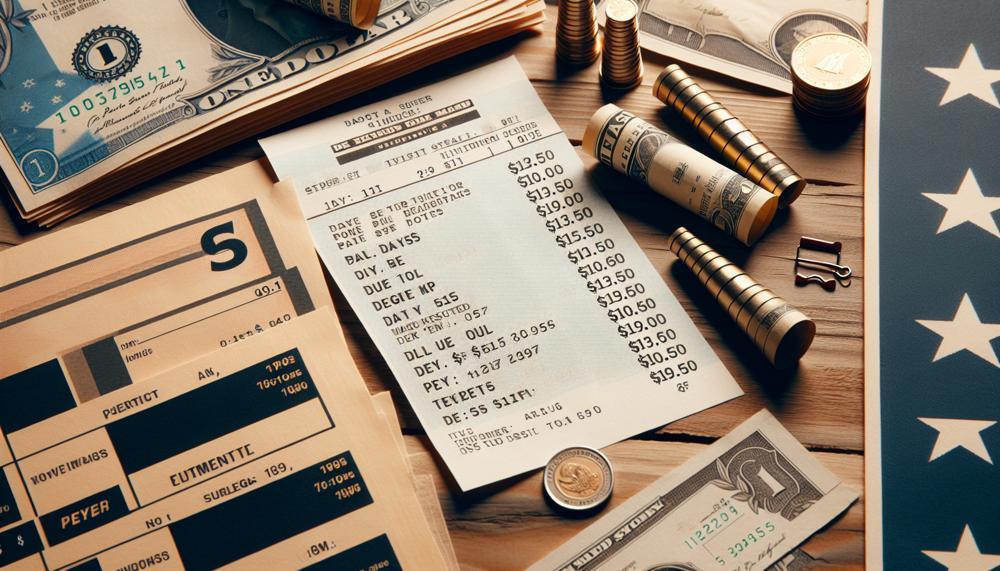Are you tired of constantly battling clutter in your home or office? Are you drowning in a sea of paper, including those pesky pay stubs? The thought of finally throwing them away may have crossed your mind.
But before you reach for the shredder, let’s dive into the question at hand: can pay stubs be tossed out?
- Pay stubs hold sensitive information such as your name, address, and social security number.
- They serve as vital proof of income for loan applications and tax purposes.
- Some states have strict laws requiring employers to provide employees with access to their pay stubs.
- With the rise of electronic pay stubs, physical copies are becoming less necessary.
- The IRS recommends keeping tax records for at least three years.
- Consider digitizing and storing your pay stubs for easy access in the future.
While the idea of getting rid of those old pay stubs may be tempting, it’s important to consider the potential consequences.
However, thanks to technology advancements and digital options, managing and storing pay stubs has become more convenient than ever.

Ultimately, the decision is yours – just make sure you carefully weigh the pros and cons before tossing those seemingly harmless pieces of paper.
Contents
Can You Throw Away Pay Stubs?
Throwing away old pay stubs is typically considered safe, but it’s always a good idea to hold onto them for at least three years in case of any tax-related issues.
Of course, there are a few factors to keep in mind before getting rid of them, including state laws and your personal situation. Regardless, it’s crucial to dispose of these documents properly by shredding or destroying them to safeguard your personal information from potential identity theft.
And if you’re looking to be eco-friendly, consider recycling your paper pay stubs to minimize waste and protect the environment.
Additionally, there are situations where keeping old pay stubs may not be necessary. For instance, if you have signed up for electronic statements or have access to your pay stubs online, you may not need physical copies anymore.
It’s still essential to dispose of them properly by either shredding or destroying them to avoid any potential security breaches.
Where Can You Throw Away Pay Stubs?
When it comes to getting rid of pay stubs, there are multiple safe and secure methods you can choose from.
These include shredding, burning, recycling, and securely storing them. Each option has its own unique benefits and should be carefully considered based on your individual circumstances.
| Option | Benefits | Considerations |
| Shredding | – Protects against identity theft – Convenient to do at home – Can also shred other personal documents simultaneously |
– Requires a reliable shredder – Can be time-consuming for large volumes of documents |
| Burning | – Completely destroys personal information – No special equipment needed – Can be done in a safe outdoor area |
– Only recommended for small amounts of documents – Must follow fire safety precautions – May not be suitable for those with respiratory issues |
| Recycling | – Environmentally friendly option – Reduces the need for deforestation – Helps manage waste effectively |
– Must first securely dispose of documents – May require extra time and effort to find a recycling facility that accepts sensitive documents |
| Securely Storing | – Recommended by experts as the safest option – Protects against identity theft and fraud – Allows access to important financial information if needed |
– Requires a secure place for storage (e.g. locked filing cabinet) – May take up physical space if keeping physical copies rather than electronic statements |
In general, it is crucial to dispose of pay stubs correctly to safeguard against identity theft and fraud, as well as contribute to waste management and environmental conservation.
Depending on your specific circumstances, you may choose to use one or a combination of these options to securely and safely get rid of your pay stubs.
What Happens to Pay Stubs That Are Recycled?
Pay stubs, similar to any other paper product, can be repurposed to lessen waste and mitigate the environmental impact of paper production.
Let’s delve into the process of recycling pay stubs and its positive influence on the environment.
Recycling Process:
- Gathering: The initial step in recycling pay stubs is collecting them from businesses or individuals who no longer require them. These pay stubs are then sorted and sent to a recycling facility.
- Shredding: Once at the recycling facility, the pay stubs are torn into small pieces to make them easier to process.
- Pulpification: The shredded pay stubs are mixed with water and chemicals to break them down into a pulp-like consistency.
- Purification: The pulp is then filtered to eliminate any impurities, such as staples or clips, which can harm recycling equipment.
- Ink Removal: The pulp is washed and treated with chemicals to remove any ink or toner residue.
- Drying: The clean pulp is then dried and rolled into large sheets of recycled paper.
- Sizing and Packaging: Finally, the recycled paper is sized into various dimensions and packaged for distribution.
Impact on the Environment:
- Reduces Waste: Recycling pay stubs minimizes waste by keeping them out of landfills where they would take years to decompose.
- Preserves Forests: By using recycled paper instead of virgin paper, fewer trees need to be felled, preserving forests and mitigating deforestation.
- Decreases Carbon Footprint: Digital pay stubs consume 90% less energy than physical ones, resulting in a significant decrease in a company’s carbon footprint.
- Minimizes Greenhouse Gas Emissions: The transportation of physical pay stubs contributes to greenhouse gas emissions, which can be eliminated by using digital pay stubs.
- Reduces Office Clutter: Digital pay stubs leave no physical trace and minimize office clutter, leading to a more organized and eco-friendly workplace.
- Fosters Environmental Mindfulness: Transitioning to digital pay stubs can foster a culture of environmental mindfulness within a company, promoting other eco-friendly practices.
How to Prepare Your Pay Subs for Disposal
When it comes to disposing of your old pay stubs, taking the right steps is crucial. Here’s what you need to do:
To ensure proper disposal, it’s important to determine the right time frame for keeping your pay stubs. This can be based on IRS guidelines, as well as your personal situation.
To securely dispose of your pay stubs, consider investing in a personal shredder or using a professional shredding service. This ensures that your personal information remains safe.
Opting for electronic statements instead of paper copies can also be a smart move. This eliminates the need for physical copies and reduces the risk of identity theft.
If you do have physical copies that need to be disposed of, make sure to mix them with other papers before getting rid of them. This makes it more difficult for anyone to retrieve them and access your personal information.
Seeking guidance from your company’s human resources department or a financial advisor can also be helpful. They can provide you with proper disposal procedures and additional tips to prevent identity theft.
| Step | Instructions |
| 1 | Determine the appropriate time frame for keeping your pay stubs based on IRS guidelines and your personal situation. |
| 2 | To securely dispose of your pay stubs, consider investing in a personal shredder or using a professional shredding service. |
| 3 | Opt for electronic statements instead of paper copies to eliminate the need for physical copies and reduce the risk of identity theft. |
| 4 | If you have physical copies that need to be disposed of, mix them with other papers before getting rid of them. |
| 5 | Consult with your company’s human resources department or a financial advisor for guidance on proper disposal procedures and additional tips to prevent identity theft. |
Properly disposing of old pay stubs is an important part of protecting your personal information and preventing identity theft. By following these steps, you can confidently dispose of your old pay stubs without worrying about the risk of identity theft.
How Long To Keep Pay Stubs?
According to the Internal Revenue Service (IRS), it is advisable to retain pay stubs for a minimum of three years as they may request documentation for tax purposes during this time period.
However, personal preferences and state laws may also play a role in determining the length of time one should keep pay stubs. It is crucial to maintain records of final pay stubs and other tax-related documents for future reference.
For instance, some states have their own regulations regarding how long employers must retain employee payroll records. In these cases, state laws may require businesses to keep pay stubs for a longer period than three years. Additionally, some individuals may choose to keep their pay stubs for a longer time as a personal preference or for their own record-keeping purposes.
Furthermore, retaining final pay stubs is not only important for tax purposes but also serves as proof of income and employment history. This can be particularly useful when applying for loans or mortgages, as lenders often require this information.
Also Read: Can You Recycle Laminate Flooring?
Conclusion
In conclusion, the thought of getting rid of old pay stubs may seem appealing, but it’s important to consider the potential consequences. These documents hold sensitive information and serve as crucial proof of income for loan applications and taxes.
In fact, some states have strict laws requiring employers to provide access to pay stubs, and the IRS recommends keeping tax records for at least three years.
However, with the increasing use of electronic pay stubs, physical copies are becoming less necessary. It is crucial to properly dispose of these documents by shredding or destroying them to protect against identity theft.
Alternatively, digitizing and storing pay stubs can offer convenient access in the future while also reducing waste and promoting environmental conservation.
Ultimately, the decision is yours – just make sure you carefully weigh the pros and cons before tossing those seemingly harmless pieces of paper into oblivion.





